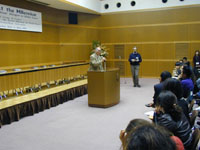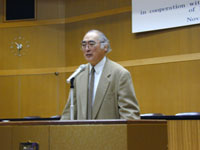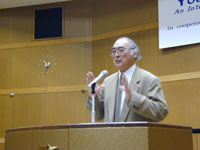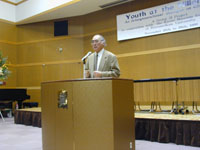[The following is the transcription of Kinhide Mushakouji's Dialogue. It remains unedited at present, but will be updated shortly]
Another very important event
of the United Nations which is going to take place in the year 2001 in two
years time is a U.N. conference to eliminate racism, to combat all forms of
discrimination and lack of tolerance. And there the question will be asked
about all forms of discrimination based not only upon race, but also on
caste and on other such issues, but primarily about rascism. Now these
problems, unfortunately have been very serious during the 20th century, and
I hope that they will be less serious in the 21st century. But at the end
of the century with the process of globalisation, all kinds of
discrimination are getting worse. There is the (omission) of poverty, which
is accompanied by different kinds of serious issues - one issue which I am
personally very much interested in tackling as much as I can, as secretary
general of an NGO called the "International Movement against Discrimination
and Racism" is the question of trafficking in women, which is clearly a
gender discrimination and a racist discrimination in the sense you have in
Japan many women from poorer countries, and they are discriminated against
because of their racial origin and because the are indigenous people
sometimes, and so on. I'm not going into it, but I wanted to raise the
question about the combined discrimination of racism and gender. You have
my question: what kind of discrimination do you have in your own country,
and how are you going to tackle it? That is the first point.
My second question is what kind of plans of action, what kind of project,
what kind of practical ways to deal with these problems you are thinking
of. Since we are here, my question is, what is the follow up? How can you
follow this up? Probably if you can have a kind of internet dialogue
triggered off through your discussion here, this could become a new U.N.
University - outside of the U.N. and much more free. So that's my second
question.
My third question is a very humble question. Do you think that we old
people can be of some help or do you want us to disappear. [laughter]
That's my last question. I was told by the organisers to answer your
questions, but before that I would like you to answer my questions, and
there are three of them.
Racquel Silva [?]: First of all, about the internet I think it's very
possible for countries like Japan to have a dialogue on the internet., but
in Venezuela, my country, only eighteen percent of the population have
telephone lines. And maybe three or four percent can read, so it'll be a
problem. And I don't see the internet as a mass media at all. That's one
part, and from my point of view, I think I am prepared to change my life.
The difference that I see from í68 or the "hippy movement" is that they
were all together, they had the same idea, what happened here - we all want
to change and just grow. But last night, five or six people, we all had
different ideas, and we all had to fight for our own ideas, so even though
we were all together - we were laughing, dancing, drinking beer, but my
truth is my truth and we could not get together - five of us. I mean we say
let's go together against whatever - we have an "against" ideal. And I
think that the responsibility is in each one of us to decide what kind of
life we want to have, for my country, for my children. I think that in my
point of view the group is not working as a (omission). These were my two
comments - I tried to answer your question, and I don't think you old
people should disappear at all, because my grandfather, he's like my
teacher. I also have a question - I understand about discrimination. I have
never felt in my life this thing that because I'm a woman, because I'm
South American, I have never had this feeling, so I don't know what it is
really. But I know we speak about gender discrimination, racial
discrimination and I wondered, for example, last night three of us were
speaking about the problems in Japan for the Burakumin. And there's a girl
who's doing research on this topic. And for me, I cannot understand how
people are still discriminating (omission) I mean it's not the people who
are here who are responsible, it's the an ancestor - it really has to do
with the culture, but you explain to me why there is logic - I find no
logic in this kind of discrimination.
Professor Mushakouji:
Now I'm very happy to learn that you come from Venezuela - I have a
favourite TV program. She's here also on cable TV She's called "Cassandra."
And if you have watched Cassandra, I don't think you can consider that you
don't have discrimination in Venezuela. You have a Roma people called the
"Itanos"[?], the gypsies. You don't think it is discrimination but if you
belong to such a group you will know that they are very proud. And in the
TV program, they are very active, there is no discrimination, maybe. But
one who is very proud to work with the Buraku people, because my NGO has
been founded by the Buraku Liberation League. And we are also in close
touch with the (omission) Roma in Europe. Unfortunately we have not yet
contacted the Roma people in Latin America. We are working with the
indigenous peoples. But I don't think you can consider the discrimination
against indigenous peoples, maybe not so much in Venezuela, but in Central
America.
Racquel Silva: I just said I have never felt it
Professor Mushakouji:
[This was followed by several questions from the audience and delegates. Click here to continue] I would like today, since I was unable to attend yesterday's session, to
make my comments different from the one's yesterday, by referring first to
the United Nations, and stress the importance the United Nations is putting
on eliminating all kinds of discrimination - gender discrimination, racial
discrimination and other kinds of discrimination which are (omission) and
my remark will lead to three questions which are about how you are going to
tackle these questions or whether you are interested in tackling these
questions. The United Nations has next year a meeting called Beijing Plus
Five. It is going to discuss the results which are not so good of what the
world and the governments of the world have done since the Beijing
conference in 1995, to eliminate all forms of discrimination based on
gender - discrimination against women. And there is already an NGO forum on
the website, an NGO internet forum on the questions which are going to be
discussed next year on gender discrimination.
I would like today, since I was unable to attend yesterday's session, to
make my comments different from the one's yesterday, by referring first to
the United Nations, and stress the importance the United Nations is putting
on eliminating all kinds of discrimination - gender discrimination, racial
discrimination and other kinds of discrimination which are (omission) and
my remark will lead to three questions which are about how you are going to
tackle these questions or whether you are interested in tackling these
questions. The United Nations has next year a meeting called Beijing Plus
Five. It is going to discuss the results which are not so good of what the
world and the governments of the world have done since the Beijing
conference in 1995, to eliminate all forms of discrimination based on
gender - discrimination against women. And there is already an NGO forum on
the website, an NGO internet forum on the questions which are going to be
discussed next year on gender discrimination.
 The second point I'd like to make is also related to our question. In 1968
I was already a University Professor. It was too bad for me, because that
was the time of the University uprisings of the students all around the
world. And my question is: what do you think about (omission). Are you
aware that some youth had an uprising already thirty years ago. In terms of
opening up the world to a new better world without discrimination, and on
the basis of dialogue on different ideologies and cultures. There was this
uprising in China - it's now considered to be very bad - the Cultural
Revolution. It was a revolution in a sense a people's revolution, also in
the United States to fight against the Vietnam War, and it was around the
world an uprising of students who were dissatisfied with the university
education that they were receiving from people like myself. And so this is
the kind of movement which started off and then dropped, or failed. And now
my question is whether you are ready to start again and try in a different
way to raise the voices of the youth at the turn of this millennium, to
improve and, if not eliminate, at least reduce the amount of discrimination
- both racial and gender - and also increase the hope of better
understanding and tollerance between different world civilisations.
The second point I'd like to make is also related to our question. In 1968
I was already a University Professor. It was too bad for me, because that
was the time of the University uprisings of the students all around the
world. And my question is: what do you think about (omission). Are you
aware that some youth had an uprising already thirty years ago. In terms of
opening up the world to a new better world without discrimination, and on
the basis of dialogue on different ideologies and cultures. There was this
uprising in China - it's now considered to be very bad - the Cultural
Revolution. It was a revolution in a sense a people's revolution, also in
the United States to fight against the Vietnam War, and it was around the
world an uprising of students who were dissatisfied with the university
education that they were receiving from people like myself. And so this is
the kind of movement which started off and then dropped, or failed. And now
my question is whether you are ready to start again and try in a different
way to raise the voices of the youth at the turn of this millennium, to
improve and, if not eliminate, at least reduce the amount of discrimination
- both racial and gender - and also increase the hope of better
understanding and tollerance between different world civilisations.
 In 1969, just after the 1968 movement, there was a great idea which was
dropped by the then secretary general of the United Nations - Utat [?]. Now
you hear much about the clash of civilisations, which is an idea of Sam
Huntington of Harvard University. In the late sixties, it was just the
opposite, Utat wanted to find wisdom among different civilisations, not by
clash, but by dialogue, because he was aware that the Euro-centric United
Nations was unable to solve all the global problems, which were emerging
then, but are now in very bad shape - the environment and so on. And then
he wanted to call upon different civilisations to set up a University - and
that was the United Nations University. And do you know that in that
University, Utat was very significant. He wanted the youth, the young
students and young professors to come together from different religions and
world civilisations, because he realised that old gurus will not be able to
develop new ideas. New ideas would come from the youth who were fighting
within civilisations - that was what the cultural revolution was all about.
And that was what he hoped the U.N. University could gather together in a
kind of dialogue among the youth of the world, and get from them a wisdom
which the United Nations lacked then, and is still lacking, to solve all
these problems. So, it's not a violent clash of civilisations, but to have
a dialogue which will not only solve cultural differences but to have the
wisdom to solve all the problems which are not solvable using that
Euro-centric, modernistic idea. And so my second question is: What do you
think of this idea and can you start again what the United Nations
University could not do? Johan Galtung has written an interesting piece
about "the dream which came false." The idea is that dreams should come
true, but U.N.U. was a dream which came false. And I was also responsible
for part of it, but from the beginning Utat's dream came false because
nobody could really understand his revolutionary idea - to have the youth
changing the world, and changing the U.N. to begin with. So my question is
whether you can start a new U.N. University. You don't have to create a
university, you have the website, and you can already have a dialogue
without a university. The means are there, the internet is there - so you
don't need a university with a campus. My question to those who are willing
to approach this problem, meaning to overcome all kinds of discrimination.
But also to go beyond to create a new civilisation without discrimination
including discrimination against nature.
In 1969, just after the 1968 movement, there was a great idea which was
dropped by the then secretary general of the United Nations - Utat [?]. Now
you hear much about the clash of civilisations, which is an idea of Sam
Huntington of Harvard University. In the late sixties, it was just the
opposite, Utat wanted to find wisdom among different civilisations, not by
clash, but by dialogue, because he was aware that the Euro-centric United
Nations was unable to solve all the global problems, which were emerging
then, but are now in very bad shape - the environment and so on. And then
he wanted to call upon different civilisations to set up a University - and
that was the United Nations University. And do you know that in that
University, Utat was very significant. He wanted the youth, the young
students and young professors to come together from different religions and
world civilisations, because he realised that old gurus will not be able to
develop new ideas. New ideas would come from the youth who were fighting
within civilisations - that was what the cultural revolution was all about.
And that was what he hoped the U.N. University could gather together in a
kind of dialogue among the youth of the world, and get from them a wisdom
which the United Nations lacked then, and is still lacking, to solve all
these problems. So, it's not a violent clash of civilisations, but to have
a dialogue which will not only solve cultural differences but to have the
wisdom to solve all the problems which are not solvable using that
Euro-centric, modernistic idea. And so my second question is: What do you
think of this idea and can you start again what the United Nations
University could not do? Johan Galtung has written an interesting piece
about "the dream which came false." The idea is that dreams should come
true, but U.N.U. was a dream which came false. And I was also responsible
for part of it, but from the beginning Utat's dream came false because
nobody could really understand his revolutionary idea - to have the youth
changing the world, and changing the U.N. to begin with. So my question is
whether you can start a new U.N. University. You don't have to create a
university, you have the website, and you can already have a dialogue
without a university. The means are there, the internet is there - so you
don't need a university with a campus. My question to those who are willing
to approach this problem, meaning to overcome all kinds of discrimination.
But also to go beyond to create a new civilisation without discrimination
including discrimination against nature.
 I have three questions I would like to raise with you. The first is a
challenging question. Are you ready to continue what the youth at the end
of the 1960s failed to achieve? Are you ready to change the world through
youth power and eliminate all forms of gender and racial discrimination?
And to go beyond that and build a new open civilisation? I will not have
time to touch upon the expectation I have of you, let me just say that I
have a great admiration for the youth interest in what is called "World
Music." World Music is the music which comes from different ethnic groups
from indigenous peoples and so on, and the youth is interested in all these
musics which are not just western classic music, and that is a really
hopeful sign that you will be able to do what the people in 1968 could not,
because they did not have world music, they had good music coming from
Great Britain, but that was not enough.
I have three questions I would like to raise with you. The first is a
challenging question. Are you ready to continue what the youth at the end
of the 1960s failed to achieve? Are you ready to change the world through
youth power and eliminate all forms of gender and racial discrimination?
And to go beyond that and build a new open civilisation? I will not have
time to touch upon the expectation I have of you, let me just say that I
have a great admiration for the youth interest in what is called "World
Music." World Music is the music which comes from different ethnic groups
from indigenous peoples and so on, and the youth is interested in all these
musics which are not just western classic music, and that is a really
hopeful sign that you will be able to do what the people in 1968 could not,
because they did not have world music, they had good music coming from
Great Britain, but that was not enough.
 Number one. I appreciate your criticism about the internet. I still would
like to propose the following. We have to organise ourselves. The youth
have to organise yourselves on different levels. You have to help the true
people who don't read. They are the most important part of (omission).
They should be the major force. They're ideas have to be gathered and
translated by some "organic intellectuals" and then, most of the organic
intellectuals don't have internet, although some have faxes. So we can
combine fax and internet and mediate those ideas. So that's difficult, but
it's my question, whether it's not possible.
Number one. I appreciate your criticism about the internet. I still would
like to propose the following. We have to organise ourselves. The youth
have to organise yourselves on different levels. You have to help the true
people who don't read. They are the most important part of (omission).
They should be the major force. They're ideas have to be gathered and
translated by some "organic intellectuals" and then, most of the organic
intellectuals don't have internet, although some have faxes. So we can
combine fax and internet and mediate those ideas. So that's difficult, but
it's my question, whether it's not possible.
 Of course. Yes. I'm sorry. I misinterpreted you. So actually most people -
ninety-nine per-cent of the non-Burakumin Japanese feel that they're not
discriminated against, and that Japan is not a racist country, but now that
South Africa has legally eliminated apartheid, Japan is one of the most
racist countries. We think that the Japanese are the only clever and good
people, and so we discriminate against our fellow brothers and sisters from
Korea, for example. And the indigenous island people, and even the Okinawan
people. So this is the problem that we have to think of. Now the Burakumin
is a silly discrimination, but there exist similar discrimination in
England and actually the Roma or (omission) gypsy discrimination is also
historical. But it's part of the global economy where those people who are
not useful for promoting economic development, or who are more useful - the
Buraku people are not useful for Japanese economic development to be
discriminated against. You have the emperor at the top and the Burakumin at
the bottom and this creates a kind of middle class consciousness, and all
the Japanese feel that they are together - that they need to have somebody
at the bottom, to discriminate against in order to feel good and united.
And that's the problem we have in Japan with the Buraku discrimination.
It's not just an old remnant of traditional discrimination, it's a very
contemporary discrimination.
Of course. Yes. I'm sorry. I misinterpreted you. So actually most people -
ninety-nine per-cent of the non-Burakumin Japanese feel that they're not
discriminated against, and that Japan is not a racist country, but now that
South Africa has legally eliminated apartheid, Japan is one of the most
racist countries. We think that the Japanese are the only clever and good
people, and so we discriminate against our fellow brothers and sisters from
Korea, for example. And the indigenous island people, and even the Okinawan
people. So this is the problem that we have to think of. Now the Burakumin
is a silly discrimination, but there exist similar discrimination in
England and actually the Roma or (omission) gypsy discrimination is also
historical. But it's part of the global economy where those people who are
not useful for promoting economic development, or who are more useful - the
Buraku people are not useful for Japanese economic development to be
discriminated against. You have the emperor at the top and the Burakumin at
the bottom and this creates a kind of middle class consciousness, and all
the Japanese feel that they are together - that they need to have somebody
at the bottom, to discriminate against in order to feel good and united.
And that's the problem we have in Japan with the Buraku discrimination.
It's not just an old remnant of traditional discrimination, it's a very
contemporary discrimination.
|
|
|
|
|
|
|
|
|
|
|
|